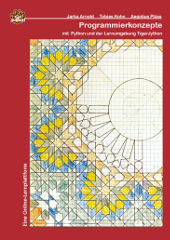Harshad-Zahl (Schleifen)
Eine natürliche Zahl, die durch ihre eigene Quersumme teilbar ist, heißt Harshad- oder Niven-Zahl.
Zum Beispiel:
777 ist durch 7 + 7 + 7 = 21 teilbar und damit eine Harshad-Zahl.
Schreibe ein Programm, das alle Zahlen bis n testet, ob sie Harshad-Zahlen sind. Das Programm soll alle Harshad-Zahlen ausgeben.
0 Kommentare
28 Lösung(en)
- python
- java
- scala
- lisp
- php
- c
- cpp
- perl
- python
- vb
- shell
- python
- generic
- ruby
- java
- python
- javascript
- csharp
- php
- python
- java
- javascript
- python
- python
- csharp
- cpp
- vb
- cpp
def harshad(n):
zahl = 1
while zahl < n:
for i in range(zahl,n):
neu = str(i) #aus der Zahl i wird ein String gebildet...
liste = list(neu) #... der jetzt in seine Einzelteile zerlegt und diese in einer Liste gespeichert werden ...
summe = 0
for item in liste:
item = int(item) #... und nun wird jedes Einezlteil zu int konvertiert
summe +=item #... damit alle Ziffern zur Quersumme addiert werden könen
if i % summe == 0:
print (i, " ist eine Harshad-Zahl. Quersumme: ", summe)
zahl+=1
i+=1
harshad(100)
Lösung von: Py Thon ()
package ch.programmieraufgaben.methoden;
import java.util.Scanner;
/**
* Harshad Zahlen aus Programmieraufgaben.CH
*
* @author Philipp Gressly (phi AT gressly DOT ch)
*/
public class HarshadZahlen {
public static void main(String[] args) {
new HarshadZahlen().top();
}
void top() {
int max = einlesen("Obergrenze");
schleife(1, max);
}
/**
* Prüfe von allen Zahlen von min bis max, ob es Harshad Zahlen sind.
*/
void schleife(int min, int max) {
int i = min;
while(i <= max) {
pruefe(i);
i = i + 1;
}
}
/**
* Prüfe auf Harshad Zahl und gib sie aus, falls es eine ist.
*/
void pruefe(int testZahl) {
int quersumme = quersumme(testZahl);
if(teilbar(testZahl, quersumme)) {
System.out.println(testZahl + " ist Harshad Zahl.");
}
}
/**
* Berechne die Quersumme der zahl x
* @param testZahl
* @return
*/
int quersumme(int x) {
int quersumme = 0;
while(x > 0) {
quersumme = quersumme + x%10;
x = x / 10;
}
return quersumme;
}
/**
* Prüfe auf Teilbarkeit
*/
boolean teilbar(int zahl, int moeglicherTeiler) {
return 0 == zahl % moeglicherTeiler;
}
/**
* Lese int ein.
*/
Scanner sc = new Scanner(System.in);
int einlesen(String wert) {
System.out.println("Bitte " + wert + " eingeben: ");
return sc.nextInt();
}
} // end of class HarshadZahlen
Lösung von: Philipp G. Freimann (BBW (Berufsbildungsschule Winterthur) https://www.bbw.ch)
object Harshad {
def main(args: Array[String]): Unit = {
print("Obergrenze eingeben: ")
for(i <- 1 to Console.readInt)
if(i % i.toString.map(_.asDigit).sum == 0) println(i)
}
}
Lösung von: Name nicht veröffentlicht
(defun quer-summe (n)
"Berechnet die Quersumme einer natürlichen Zahl."
(if (or (not (numberp n)) (floatp n) (< n 0))
nil
(labels
((q (result k)
(if (> k 0)
(q (+ result (rem k 10)) (floor k 10))
result)))
(q 0 n))))
(defun harshad (n)
"Berechnet die Zahlen, die durch ihre eigene Quersumme teilbar sind."
(labels
((h-p (k)
(= (rem k (quer-summe k)) 0)))
(remove-if-not #'h-p (range 1 n))))
Lösung von: Stefan Meichtry (Erwachsenenbildung)
<?php
function harshad($n)
{
$checksum=0;
$result;
for($i=1;$i<=$n;$i++)
{
for($j=0;$j<strlen($toString="".$i);$j++)
{
$checksum+=$toString[$j];
}
if($i%$checksum==0)
{
echo "$i<br/>";
}
$checksum=0;
}
}
harshad(777);
?>
Lösung von: Alex Hasl ()
#include <stdio.h>
int check(int i)
{
int h = i,
quersumme = 0;
while(h > 9)
{
quersumme += h%10;
h = h / 10;
}
quersumme += h;
if(i%quersumme == 0)return 1;
else return 0;
}
int main()
{
int i, n;
printf("Eingabe n: ");
scanf("%d", &n); fflush(stdin);
for(i = 1; i <= n; i++)
if(check(i))printf("%d ist eine Harshadzahl.\n", i);
return 0;
}
Lösung von: Christian :) (Hochschule Merseburg)
// Autor: Andy Großhennig
// Solution for task: Harshad-Zahl (Schleifen)
#include <iostream>
using namespace std;
// Function: Calculate the cross sum of the number
unsigned int calculateCrossSum(unsigned int iNumber)
{
unsigned int iCrossSum = 0;
while(iNumber != 0)
{
iCrossSum += iNumber % 10; //Get the last digit of the number
iNumber /= 10; //delete the last digit of the number
}
return iCrossSum;
}
// Function: Provide a number, get their cross sum and calculate the modulo from the number through its cross sum
void checkNumb()
{
unsigned int iCrossSum = 0;
// Loop: Check for Harshad number until iNumber and show if iNumber a Harshad number
for(unsigned int iNumber = 1;iNumber <= 5000;iNumber++)
{
iCrossSum = calculateCrossSum(iNumber);
if(iNumber % iCrossSum == 0) cout << iNumber << " ist eine Harshad-Zahl\n";
}
}
int main()
{
checkNumb();
cout << "\n\n";
system("Pause");
return 0;
}
Lösung von: Andy Großhennig (Bundeswehr)
$in; #eingabe
@nm; #zahl (numbers) gesplittet
$arr; #Menge der Zahlen
@ha; # harshad zahlen
$hanr=0;# array feld in das die harshadzahl kommt
$zw; #Zwischenwert beim rechnen
print"Willkommen beim Harshadzahlenrechner!\n\n";
print"Bis zu welcher Zahl wollen sie die Harshad zahlen haben? ";
chomp($in=<STDIN>);
for($i=1; $i <= $in; $i++){
@nm=split('', $i);
$arr=@nm;
for($y=0 ; $y < $arr ; $y++){
$zw += $nm[$y];
}
if($i % $zw == 0){
$ha[$hanr]=$i;
$hanr++;
}
$zw=0;
}
$arr=@ha;
for($i=0; $i < $arr; $i++){
print $ha[$i], " ";
}
Lösung von: Name nicht veröffentlicht
def harshad(zahl):
if zahl % sum([int(i) for i in str(zahl)]) == 0:
print "ja"
else:
print "nein"
harshad(int(raw_input('zahl: ')))
Lösung von: Name nicht veröffentlicht
Dim eingabe As String 'Als String
Dim zähler As Integer
Dim quersumme As Integer
Dim ziffer As Integer
eingabe = txtEin.Text
For zähler = 1 To eingabe.Length
ziffer = Mid(eingabe, zähler, 1) ' Zerteilen in einzelne Ziffern
ziffer = CInt(ziffer) 'Zurück zu Integer um damit zu rechnen
quersumme = quersumme + ziffer 'Alle Zahlen zusammen addieren
Next
If eingabe Mod quersumme = 0 Then 'Wenn kein Rest übrig bleibt ->
txtAus.Text = " ist eine Harshard-Zahl!"
Else
txtAus.Text = " ist keine Harshard-zahl!"
End If
Lösung von: Johannes vh ()
typeset -i max=$1 i=1 j=0 qsumme=0
string=""
while (($i <= $max))
do
string=$i
while (($j < ${#string}))
do
qsumme=$qsumme+${string:j:1} #nur bei bash möglich
j=j+1
done
if (($i % $qsumme == 0))
then
echo $i" (% "$qsumme")"
fi
i=$i+1
j=0
qsumme=0
done
Lösung von: Benny H. ()
#!/usr/bin/env python
harshad = int(raw_input("Enter possible Harshad value: "))
harshad_string = str(harshad)
sum = 0
for i in range(0, len(harshad_string)):
sum += int(harshad_string[i])
if harshad % sum == 0:
print("It's a harshad value")
else:
print("It's not a harshad value")
Lösung von: Matthias Sayler (Bosch)
//Programmiersprache: Go
package main
import (
"fmt"
"strconv"
)
func main() {
val, sum := 777, 0
str := strconv.Itoa(val)
for _, r := range str {
n, _ := strconv.Atoi(string(r))
sum += n
}
if val % sum == 0 {
fmt.Println("Found Harshad value.")
} else {
fmt.Println("No Harshad value found.")
}
}
Lösung von: Matthias Sayler (Bosch)
n = gets.chomp
(1..n.to_i).each do |i|
checksum = i.to_s.split('')
checksum.each_index {|i| checksum[i] = checksum[i].to_i}
checksum = checksum.inject {|sum, i| sum + i}
if i % checksum == 0
puts i
end
end
# gibt alle Harshad Zahlen von 1 bis einschließlich n aus
Lösung von: Name nicht veröffentlicht
package programmierenuebungen;
import java.util.Scanner;
/**
*
* @author MadDeer
*
* Erklaerung: Eine Harshard-Zahl ist durch ihre Quersumme ohne Rest teilbar.
*
*/
public class harshardZahl {
public harshardZahl(int AnfangsZahl, int EndZahl){
calculate(AnfangsZahl, EndZahl);
}
private void calculate(int AnfangsZahl, int EndZahl) {
for (int i = AnfangsZahl; i <= EndZahl; i++) {
if (i % quersumme(i) == 0) {
System.out.println("Die Zahl \"" + i + "\" ist eine Harshard-Zahl.");
}
}
}
private int quersumme(int zahl) {
if (zahl < 10) {
return zahl;
} else {
return zahl % 10 + quersumme((int) zahl / 10);
}
}
public static void main(String[] args){
//Benutzereingabe holen
Scanner scanner = new Scanner(System.in);
System.out.print("Anfangszahl: ");
int anfangsZahl = Integer.parseInt(scanner.nextLine());
System.out.println("Endzahl: ");
int endZahl = Integer.parseInt(scanner.nextLine());
//Benutzereingabe korrekt?
if (anfangsZahl < endZahl && anfangsZahl > 0) {
new harshardZahl(anfangsZahl,endZahl);
}
}
}
Lösung von: Mad Deer (FH Ulm)
def harshad(n):
assert type(n) == int
quersumme = sum([int(digit) for digit in str(n)])
return n%quersumme == 0
n = int(input("Gib das Maximum n ein: "))
print(", ".join([i for i in range(1, n+1) if harshad(i)]))
Lösung von: Karl Welzel ()
function isHarshad(num) {
return (num % (eval(num.toString().split("").join("+"))) == 0);
}
var arr = [],
n = prompt("Obergrenze:"),
x = 1;
for (x; x <= n; x++)
if (isHarshad(x)) arr.push(x);
console.log(arr.join(", "));
Lösung von: Lisa Salander (Heidi-Klum-Gymnasium Bottrop)
using System;
using System.Collections.Generic;
using System.Linq;
using System.Text;
using System.Threading.Tasks;
namespace harshadZahl
{
class Program
{
static void Main(string[] args)
{
for (int i = 1; i < 50; i++)
{
int quersumme = QuersummeErmitteln(i);
CheckIfHarshadNumber(quersumme, i);
}
Console.ReadKey();
}
private static void CheckIfHarshadNumber(int quersumme, int i)
{
if (i % quersumme == 0)
Console.WriteLine(i);
}
private static int QuersummeErmitteln(int i)
{
int quersumme = 0;
do
{
quersumme += i % 10;
i /= 10;
} while (i > 0);
return quersumme;
}
}
}
Lösung von: mattia mancina (Berufsfachschule für Informatik Bozen)
$a = 1;
//Funktion um die Quersumme zu berechnen
function quersumme ($zahlen)
{
$strZahlen = (string) $zahlen;
for( $intQuersumme = $i = 0; $i < strlen ( $strZahlen ); $i++ )
{
$intQuersumme += $strZahlen{$i};
}
return $intQuersumme;
}
/*While-Schleife um zu überprüfen
ob die Zahlen sich durch ihre Quersumme
teilen lassen können*/
while ($a <= 2000)
{
if ($a % quersumme($a) == 0)
{
if ($a % 100 == 0)
{
echo "<br>";
}
echo $a . " ";
}
$a++;
}
Lösung von: Maik Scheiermann (Powercloud GmbH)
def hartest(x):
x2=sum([int(a) for a in str(x)])
return True if x%x2==0 else False
for x in range(1,1000): print(x,hartest(x))
Lösung von: rob ert (tub)
package programmieraufgaben;
import java.util.Scanner;
/**
*
* @author David Wu
*/
public class Harshad_zahl {
public static void main(String[] args) {
Scanner sc = new Scanner(System.in);
System.out.println("Geben sie die Maximalzahl ein: ");
int maxzahl = sc.nextInt();
System.out.println("--------- Gefundene Harshad-Zahlen ------------------");
try {
for (int i = 1; i <= maxzahl; i++) {
String zahl = Integer.toString(i);
int summe = 0;
for (int k = 0; k < zahl.length(); k++) {
char a = zahl.charAt(k);
String s = Character.toString(a);
summe += Integer.parseInt(s);
}
if (i % summe == 0) {
System.out.print(i+"|");
}
}
}catch(ArithmeticException ae) {
System.err.println("Division by zero");
}catch(Exception e) {
e.printStackTrace();
}
}
}
Lösung von: David Wu (Gut-genug.com)
function getHarshadsFromZeroToUpperLimit(upperLimit) {
const harshads = [];
for (let i = 0; i <= upperLimit; i++) {
if (isHarshad(i)) harshads.push(i)
}
return harshads
}
function isHarshad(num) {
let crossSum = num.toString().split("").reduce((previousValue, currentValue) => {
return parseInt(previousValue) + parseInt(currentValue);
}, 0)
return num / crossSum % 1 === 0
}
getHarshadsFromZeroToUpperLimit(21)
Lösung von: Name nicht veröffentlicht
for i in [a for a in range(1,n) if a % sum([int(z) for z in str(a)]) == 0 ]: print(i,end = ' ')
Lösung von: rob ert (tub)
def harshad(limit):
for i in range(1, limit+1):
if i % sum([int(x) for x in str(i)]) == 0:
yield i
print(list(harshad(21)))
Lösung von: Name nicht veröffentlicht
// NET 6.x | C# 10.x | VS-2022
// Variante 1 (kompakt, aber langsam, da jede Zahl in 'string' umgewandelt werden muss)
void HarshadNumbers2(int first, int last) => Enumerable.Range(first, last - first + 1).Where(x => x % x.ToString().Select(x => x - '0').Sum() == 0).ToList().ForEach(Console.WriteLine);
HarshadNumbers2(1, 1_000);
// Variante 2 (schnell; Faktor 40 gegenüber der Variante 1 bei n{ 1e9 } jeweils ohne 'Print'));
IEnumerable<int> HarshadNumbers(int first, int last) {
for (int i = first; i < last + 1; i++)
if (i % DigitSum(i) == 0) yield return i;
int DigitSum(int n) => n != 0 ? n % 10 + DigitSum(n / 10) : 0;
}
void PrintNumbers(IEnumerable<int> lst) => Console.WriteLine(string.Join("\n", lst));
PrintNumbers(HarshadNumbers(1, 1_000));
Lösung von: Jens Kelm (@JKooP)
// C++ 14 | VS-2022
#include <iostream>
int digit_sum(int n) {
return n != 0 ? n % 10 + digit_sum(n / 10) : 0;
}
void harshad_numbers(int first, int last) {
for (auto i{ first }; i < last + 1; i++)
if (i % digit_sum(i) == 0)
std::cout << i << "\n";
}
int main() {
harshad_numbers(1, 1'000);
}
Lösung von: Jens Kelm (@JKooP)
Function DigitSum(ByVal n%)
r% = 0
Do While n > 0
r = r + n Mod 10
n = n \ 10
Loop
DigitSum = r
End Function
Sub PrintHarshadNumbers(ByVal first%, ByVal last%)
For i% = first To last
If i Mod DigitSum(i) = 0 Then Debug.Print i
Next i
End Sub
Sub Main()
PrintHarshadNumbers 1, 100
End Sub
Lösung von: Jens Kelm (@JKooP)
// C++20 | VS-2022
#include <iostream>
#include <functional>
#include <vector>
inline static const auto get_harshad_numbers(const size_t& first_, const size_t& last_) {
static const std::function<size_t(size_t)>get_digit_sum{ [&](const auto& n_) {
return n_ ? n_ % 10 + get_digit_sum(n_ / 10) : 0; } };
std::vector<size_t>out;
for (auto i{ first_ }; i < last_ + 1; ++i)
if (i % get_digit_sum(i) == 0)
out.push_back(i);
return out;
}
inline static constexpr auto print(auto&& con_) {
for (const auto& elem : con_)
std::cout << elem << "\n";
}
int main() {
const auto hn{ get_harshad_numbers(1, 1'000) };
print(hn);
}
Lösung von: Jens Kelm (@JKooP)
Verifikation/Checksumme:
1, 2, 3, 4, 5, 6, 7, 8, 9, 10, 12, 18, 20, 21
Aktionen
Neue Lösung hinzufügen
Bewertung
Durchschnittliche Bewertung:
Meta
| Zeit: | 0.25 |
| Schwierigkeit: | Leicht |
| Webcode: | psv4-t3wr |
| Autor: | () |




